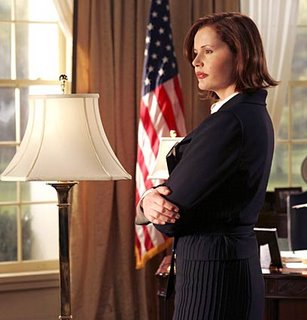 Tonight played the first of the three last unaired episodes of "Commander in Chief", a show that started out great and then was quickly and astronomically torpedoed by bad decision making at the executive level of television programming. I happened to accidentally stumble upon the episode, because it was so carefully swept under the radar that ABC probably didn't want to make too much of a fuss over the fact that it was on the air at all.
Tonight played the first of the three last unaired episodes of "Commander in Chief", a show that started out great and then was quickly and astronomically torpedoed by bad decision making at the executive level of television programming. I happened to accidentally stumble upon the episode, because it was so carefully swept under the radar that ABC probably didn't want to make too much of a fuss over the fact that it was on the air at all.
Much has been reported about how "Commander in Chief" went from highest rated and thereby most promising new show of the 2005-2006 season to ratings trainwreck just five months after its premiere. Now, as it slowly crawls toward cancellation, I'm not sure there's much to salvage save for the lesson this taught networks about how easily their own messed up politics destroy potentially good shows. The show was born under the auspices of Rod Lurie (hey, I'm still holding out for "Line of Fire" on DVD), and then he was removed by ABC in favor of Steven Bochco, who apparently had an attitude about how he wanted things done on this show that he hadn't created, and now he's been removed in favor of Dee Johnson (I guess the only person left standing), apparent apprentice of Lurie's and trying her best to restore the show's original look and style.
I stuck with the show from the beginning, and it definitely has its weak spots. After having fervently watched the first four seasons of "The West Wing" over the last three months courtesy of Netflix, I think the bar has been raised pretty high with regards to American presidential dramas. "Commander in Chief" had a lot of potential, but got severely sidetracked with Bochco's warped ninety-degree vision of where he wanted to take it. Lurie's style had an ice-slick and pop edge to it, and the storylines setup for the show were nontraditional and seemed focused more on family and interpersonal relations than inter-White House politics. Bochco came in and lightened the place up, enforced a more episodic structure to the stories, and whitewashed away Lurie's unique style and vision in favor of bland and predictable President-and-Nation-in-trouble stories. Then he mysteriously left, and then Johnson (who'd been with the show since the start) stepped up and picked up where Lurie left off. I think had that first shakeup not happened, it's likely "Commander"'s fate would have been somewhat different. If the show had more room to breathe and another season on the horizon, I think that it could have made up for lost time and started to challenge itself to become a great show. Certainly it looks like that's the direction it's moving in (behaving, almost, as if it doesn't know it's about to end); Donald Sutherland plays his Oval Office-hungry role with such effortless slime that it's almost uncomfortable to watch, and now that Geena Davis has vowed to assert her power against him, it looks like a lot of fun could be had.
I guess the only reason that ABC is airing the last episodes (yanked from the schedule last month for some reality-programming filler) is because they're under obligation to.... but they're certainly going out of their way not to advertise them because the show has become an embarrassment. I would argue so not because of the low ratings, but because of its deconstruction by their own bloody hands. Now it ends very, very quietly during the television-hangover wasteland of June programming.
But wait.... ABC is feeling remorseful? Rumor has it that there is interest in resurrecting the show as a TV movie sometime next season, with hopes that it might rekindle the series under the helm of Rod Lurie again. Strangely, this looks like the makings of basically rewriting Lurie's own The Contender (2000), an excellent movie that obviously spurned the nascent mechanics of "Commander in Chief".... but who knows? Maybe it could give the show another shot.
Wednesday, May 31, 2006
Commander in Chief dies a quiet (and messy) death
pondered by
is that so wrong?
at
11:37 PM
3
comments
![]()
Tuesday, May 23, 2006
the season finale as art
With the end of May comes the end of the television season, the summer ahead a wasteland of reruns and trashy made-for-TV filler and the occasional new series launched only so it can fail. I'm starting to get dangerously close to Food Network overexposure, so maybe it's a good thing that I take a break from TV for awhile. I just can't kill my TV or believe that the revolution will not be televised or whatever, so I hold onto it to watch the news in the morning before I go to work. I miss my Mornings on 2, but Lori Stokes on Channel 7 serves my groggy wake-up time just fine.
Last night came the finales of the fifth season of "24" and the series finale of "Alias" at the end of it's fifth season. Both were two hour events, and it was too bad they were staggered over each other. Both shows have traditionally loved to end their seasons with big bangs and cliffhangers and all that jazz, all with the hopes people will talk about it over the watercooler for four months until they return in the fall.  I think it's too bad that all serial shows seem to be stuck with the expectation of ending with shocks and season-spanning cliffhangers.... you can trace this disease back to Patient Zero, the Who-Shot-JR episode of "Dallas" from once upon a time in 1981. I would argue that the impact of the cliffhanger depends on whether or not it comes as a surprise; I think serial television drama is doomed to have an audience always expecting a cliffhanger, and thus the bar gets set higher and higher and demands can never be met. I won't be surprised if a backlash comes from tomorrow night's season finale of "Lost", because the audience is expecting (and to some extent demanding) their shocking how-could-they-do-that cliffhanger, and no matter what they come up with (anywhere on the shock-value scale) some viewers will be let down. You can't please everybody, though, and it's not in a show's best interest to try to. People will keep watching from now to next season anyway.
I think it's too bad that all serial shows seem to be stuck with the expectation of ending with shocks and season-spanning cliffhangers.... you can trace this disease back to Patient Zero, the Who-Shot-JR episode of "Dallas" from once upon a time in 1981. I would argue that the impact of the cliffhanger depends on whether or not it comes as a surprise; I think serial television drama is doomed to have an audience always expecting a cliffhanger, and thus the bar gets set higher and higher and demands can never be met. I won't be surprised if a backlash comes from tomorrow night's season finale of "Lost", because the audience is expecting (and to some extent demanding) their shocking how-could-they-do-that cliffhanger, and no matter what they come up with (anywhere on the shock-value scale) some viewers will be let down. You can't please everybody, though, and it's not in a show's best interest to try to. People will keep watching from now to next season anyway.
Alessandra Stanley of the New York Times (hey, last summer I drove her from the Long Island/Islip airport to Southampton.... long story) wrote an interesting article about the art of the season/series finale. I think it's too bad that finales only set themselves up for disappointment, and she makes a good argument about that. I believe that sometimes the best twists or most compelling episodes of television, if written just right, come in the middle of the season.... never the end, never the beginning. The season finale always seems to promise resolution but ends up asking more (and sometimes different) questions, and that's what hooks the audience. A serial television show cannot sustain itself on the same storyline conceit season after season, because the story must develop and evolve away from the inciting incident. Just look at soap operas.... they succeed because the drama is always running high and the story is constantly changing and the characters are constantly involved in different affairs (romantic and otherwise).
The ads ABC is running for "Lost" promise answers to the questions we've been asking all season, or something even more dramatic and tabloid-sounding. The problem: "Lost" is a series based on questions, and everytime something is almost answered, more questions arise in the resolution's wake. I'm afraid "Lost" will suffer a traumatic flame-out when it's ready to end because the questions are by far much more interesting than the answers.... Disappointment lurks around every corner; the audience keeps coming back every week because they are tantalized by the grand mystery, not the answer. Take a look at "Twin Peaks", a series based on the question "Who killed Laura Palmer?" It's clear that the creators (David Lynch and Mark Frost) wanted the show to gently shake this question off and become about the characters in the town of Twin Peaks and their stories; Lynch has stated that if he had his way the question of Laura Palmer's killer would never be answered. The audience demanded the answer, though.... and once they got it (in perhaps the best episode of television ever filmed) they fled. Why? Because their question was answered. Simple as that.
Take a look at "Twin Peaks", a series based on the question "Who killed Laura Palmer?" It's clear that the creators (David Lynch and Mark Frost) wanted the show to gently shake this question off and become about the characters in the town of Twin Peaks and their stories; Lynch has stated that if he had his way the question of Laura Palmer's killer would never be answered. The audience demanded the answer, though.... and once they got it (in perhaps the best episode of television ever filmed) they fled. Why? Because their question was answered. Simple as that.
A series based on questions like "Lost" must give answers (but can you imagine if the writers consciously didn't? Now that would be crazy). The writers know, though, that what keeps the audience coming back is the very mystery; they can't lose this. The very concept of the show has an invisible ticking clock resting on its shoulders, though.... the inital story-based conceit is permanently ingrained to whatever story evolves down the line. These people are stuck on an island; their lives have inexplicably intertwined before they even met.... so, WHY? This mystery of theirs will get old sooner or later. This doesn't mean that they can't have great stories along the way, but the writers will need to know to throw away the milk before it goes rancid.
This, interestingly, is an argument for the popularity of episodic television drama like "CSI" and "Without A Trace" and the continuous and seemingly never ending sequence of "Law and Order" spin-offs: there is no long-running mystery and there is no long-term investment. The stories that episodic dramas tell do not span outside their single episodes; the answers are promised and revealed week after week. This format can be extended just fine into the two-parter (with a juicy cliffhanger at the end of Part One; for an example, see almost every season finale of "Star Trek: The Next Generation"), because the tension is amped up, and the answers nonetheless are still promised and delivered.
Now the specifics: "24"'s finale wanted so badly to shock that the "shock" was not really shocking. In fact, they played it like the audience forgot that Jack pissed off the Chinese government in Season 4 and was wanted by them. Now that Jack is in the cargo hold of some freighter bound for Shanghai (not a pleasure cruise), the questions remain high for the next season of "24". I'd be hopeful.... except that every other time the show has left its season with a cliffhanger, the following season seems to be like a strange series reboot. More often than not, the high drama of the cliffhanger never gets a payoff and remains secondary or sometimes practically forgotten; the everyday pedantics of the show require more action than story (at least how they've played it off as of late), and that's too bad. I just hope that the writers and producers of "24" know that they would have a really incredible show if they just sat down and made a plan for it instead of writing by the seat of their pants (like they have mentioned they do in past interviews). This season finale promises big questions about Jack's fate with the Chinese, but I wouldn't be surprised if we start up Season 6 with all that explained away off-camera.
"Alias"'s series finale was a nice swan song, bringing back characters of old and doing a nice bow-tying intercutting flashback wrap-up from before the action of Season 1 ever began. This show was so good in its first two seasons, but then completely lost control in Season 3 and never could get the reins back. It fell prey to sloppy writing and confusion of its own storyline, and bungled it even more come Season 4 in a strange evolutionary retreat. All that flip-flopping concerning Sloane (he's a bad guy, no, wait, he's a good guy, but wait, is he good? No, he's bad), the gaping missed opportunity with Vaughn's wife Lauren, and the contrived inclusion of Syndey's long-lost sister.... all too much. So, by the time we reach the great answers of Rambaldi in this series finale at the end of Season 5, I'm not so sure I care anymore. That said: Jennifer Garner is still on fire, and has quite a career in front of her. Lena Olin is perhaps the hottest woman in film or TV over 50. I'm glad that they remembered that Sydney's mom is bad to the bone.... it would have been a bit unsatisfying to see the Mom become some kind of good guy. Besides, the show has always been at its best when Lena Olin was there to play the Mom (and I think the writers know that), so it's only fitting that she and Sydney get to duke it out before series' end.
So, after "Lost" is over tomorrow night, the television-free summer awaits me. We'll just see how long I manage that.
pondered by
is that so wrong?
at
10:34 PM
7
comments
![]()
Friday, May 19, 2006
Cody's Books on Telegraph shuts their doors
 I'm not of the reporting type, so this isn't a news flash or anything. That said, it's a sad day for lovers of independent bookstores in the Bay Area.... Cody's Books announced last week that they were closing down their store on Telegraph Avenue in Berkeley.
I'm not of the reporting type, so this isn't a news flash or anything. That said, it's a sad day for lovers of independent bookstores in the Bay Area.... Cody's Books announced last week that they were closing down their store on Telegraph Avenue in Berkeley.
This isn't the demise of Cody's as an institution though.... apparently they're prospering just fine with their stores down on the posh Fourth Street strip and at a scrubby new locale in downtown San Francisco. The sad part is that Cody's is a Berkeley institution, an massive oasis of books and magazines amidst the grungy one-of-a-kind fervor of Telegraph Avenue. I was never down by Fourth Street for any reason (the bus took too damn long to get there, and that location always feels strangely deserted), so the Telegraph store was the place to go. This is certainly one of my favorite places to peruse books of all kinds (not only do they have an impressive collection of fiction and short story anthologies and lit mags, but also a film theory section that's yet to be matched by my eyes); the selection that they have just can't be found at Barnes & Noble or Borders. That, and it's one of the only places I know that still carries new issues of Wrapped in Plastic magazine.
What exactly has become of Telegraph Avenue as Berkeley's main drag? Business have started to jump ship over the last three years, and no matter how many American Apparels you open up, it feels like something's gone missing. If anything, Cody's is one of the last bastiens of Berkeley's literary culture, and now that it's being plucked from the university's periphery the town is being depleted of a much-needed asset. Who wants to trudge down to Fourth Street to see quality readings? Even that nice flower stand, a fixture outside of Cody's, will likely crumble in its absence. It won't, however, affect the business of that guy who sells patches from those giant plastic bins in front of Amoeba Music. Without a strong bookseller near the university, the legacy of Cody's is left to the masses in downtown San Francisco (I'm not sure they can maintain the same charm when setting up shop next door to the Virgin Megastore) and the yuppie/hippies (or "yippies".... thanks Josh) of the bourgeois North Berkeley Chez Panisse Sunday brunch crowd.
I'm sad to see it go.
pondered by
is that so wrong?
at
1:43 PM
3
comments
![]()
Saturday, May 13, 2006
star perks at starbucks
 This afternoon I was at the Starbucks on Chambers Street and West Broadway when this guy rolled on up on his bicycle, caught eye contact with me through the window and then looked away awkwardly, waltzed into the Starbucks to grab his venti frappuccino of some kind, and then waltzed back out and zoomed away up the street from whence he came on his bicycle.
This afternoon I was at the Starbucks on Chambers Street and West Broadway when this guy rolled on up on his bicycle, caught eye contact with me through the window and then looked away awkwardly, waltzed into the Starbucks to grab his venti frappuccino of some kind, and then waltzed back out and zoomed away up the street from whence he came on his bicycle.
Did I miss something? He was literally indoors for thirty seconds, tops. Did he call ahead and place an order or something? Can you even do that at Starbucks? Clearly he has an in with the barista staff. Maybe one day I can avert public attention by making advance pick-ups at Starbucks via bicycle.
pondered by
is that so wrong?
at
11:46 PM
7
comments
![]()
Friday, May 12, 2006
the best of contemporary american literature
What would you say is the best work of American fiction published in the last twenty-five years?
This is a question the New York Times thought they'd try to answer, and with a list of 125 writers and essayists and critics, they posed the question: what is the single best work of American fiction published in the last twenty-five years? Accompanied with a very readable essay about the survey and its results, they listed the twenty-or-so novels that came back with the most hits. But the top five collected more votes than all the rest:
Beloved, Toni Morrison
Underworld, Don DeLillo
Blood Meridian, Cormac McCarthy
Rabbit Angstrom: The Four Novels, John Updike
American Pastoral, Philip Roth
I would consider anything in the last twenty-five years to be "contemporary" literature, but I'm no literary scholar or critic. So, are these novels (and, by association those that qualify for the best American fiction of the last twenty-five years) contemporary literature? By "contemporary" I'm not referring to a style or mode of writing (although it can be argued that there is one to describe this tag), but rather a temporal association. I guess my definition of "contemporary" is fluid, changing as time changes, leaving behind what once was contemporary to bring new members to the team. Maybe my perspective on this will change one day.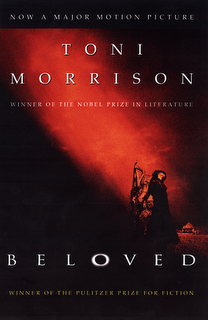 It's probably no surprise that Beloved is coronated with the title as the best work of American fiction from the last quarter century. It seems already so quintessential to American literature as a whole; it is thoroughly engrained in our minds as lit canon. As it should be.... it's a virtuoso whirlwind of weirdness and beauty and love and fear and all that other crap that I can't explain without reducing it to something that it's really not. That, and I think it's an important novel to read (something I can't say of the Updike/Roth group.... but more on that in a bit). I must admit that I find her writing sometimes to be super-dense, and I get thrown off the wagon too easily when she goes off on some tangent that I wasn't able to pick-axe into.... but I don't wane in my confidence of her writing. I remember once I was in a group of people talking about books (probably all with wine or Brooklyn beer in our hands), and everyone was talking about which author does this and which author does that, all of us dropping lit names here and there. I made some comment about how Morrison manages to do some strange ethereal stuff in her fiction that's so hard to do, and one of the people in the group looked at me blankly: "Morrison who?" they asked. Morrison who?! Has Toni Morrison not earned the right to be referred to by last name only, like we do all the greats like Faulkner, Fitzgerald, Joyce, Steinbeck, etc etc etc? Maybe it's because she's still living (but, we refer to Marquez as Marquez....), maybe it's because her work is still too fresh in our minds.... but if you don't know who Toni Morrison is, you've got some reading to do.
It's probably no surprise that Beloved is coronated with the title as the best work of American fiction from the last quarter century. It seems already so quintessential to American literature as a whole; it is thoroughly engrained in our minds as lit canon. As it should be.... it's a virtuoso whirlwind of weirdness and beauty and love and fear and all that other crap that I can't explain without reducing it to something that it's really not. That, and I think it's an important novel to read (something I can't say of the Updike/Roth group.... but more on that in a bit). I must admit that I find her writing sometimes to be super-dense, and I get thrown off the wagon too easily when she goes off on some tangent that I wasn't able to pick-axe into.... but I don't wane in my confidence of her writing. I remember once I was in a group of people talking about books (probably all with wine or Brooklyn beer in our hands), and everyone was talking about which author does this and which author does that, all of us dropping lit names here and there. I made some comment about how Morrison manages to do some strange ethereal stuff in her fiction that's so hard to do, and one of the people in the group looked at me blankly: "Morrison who?" they asked. Morrison who?! Has Toni Morrison not earned the right to be referred to by last name only, like we do all the greats like Faulkner, Fitzgerald, Joyce, Steinbeck, etc etc etc? Maybe it's because she's still living (but, we refer to Marquez as Marquez....), maybe it's because her work is still too fresh in our minds.... but if you don't know who Toni Morrison is, you've got some reading to do.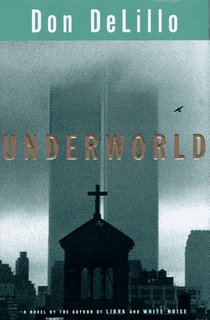 I've always wanted to read Underworld, but have been scared off too easily because it's so damn massive. Let's keep in mind that I'm in no way a fast reader; Underworld will literally take me a month or two (conservatively) to read. White Noise is perhaps my favorite novel (and probably would be my pick for the best-in-the-last-25-years list), so I know DeLillo's got the chops.... but a 900 page book is quite a commitment. I thought once that I'd try to tackle David Foster Wallace's much-beloved (no pun intended) Infinite Jest, clocking in at well above 1200 pages or so (right?), but couldn't manage to crack the first fifty.... I think that book might be a casualty betraying the maxim "less is more". I've heard that Underworld is fantastic novel, but it's the kind of book you need to duct tape to your hand in order to really get into it. Somehow that reminds me of the mythic "Edward 40-Hands" college parties, were people duct tape 40s of beer to their hands and can't do anything until they're finished. Ah, college parties. Chances are they'd be less wild if people were duct taping books to their hands instead.
I've always wanted to read Underworld, but have been scared off too easily because it's so damn massive. Let's keep in mind that I'm in no way a fast reader; Underworld will literally take me a month or two (conservatively) to read. White Noise is perhaps my favorite novel (and probably would be my pick for the best-in-the-last-25-years list), so I know DeLillo's got the chops.... but a 900 page book is quite a commitment. I thought once that I'd try to tackle David Foster Wallace's much-beloved (no pun intended) Infinite Jest, clocking in at well above 1200 pages or so (right?), but couldn't manage to crack the first fifty.... I think that book might be a casualty betraying the maxim "less is more". I've heard that Underworld is fantastic novel, but it's the kind of book you need to duct tape to your hand in order to really get into it. Somehow that reminds me of the mythic "Edward 40-Hands" college parties, were people duct tape 40s of beer to their hands and can't do anything until they're finished. Ah, college parties. Chances are they'd be less wild if people were duct taping books to their hands instead.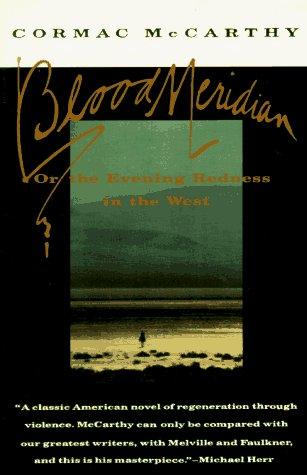 Blood Meridian is near the top of my little summer reading list, and I've always had strong interest in reading it but haven't gotten around to it yet. I must admit that I want to get to the gruesome parts (as mentioned by most people if the topic ventures to Blood Meridian), but because I've heard nothing but praise for it, it's next on my list. I first learned about Cormac McCarthy's work in a writing workshop I took a few years ago; during a class discussion, the woman sitting next to me spat acid on the work of Charles Frazier (author of Cold Mountain, a book I have not read, although the movie that is based from was not as good as I wanted it to be).... she said that Frazier blatantly ripped off McCarthy's work, and that McCarthy is not as well-praised as he should be. But.... look who's work has stood the test of time the best. Frazier's just gonna have to be happy with that National Book Award of his.
Blood Meridian is near the top of my little summer reading list, and I've always had strong interest in reading it but haven't gotten around to it yet. I must admit that I want to get to the gruesome parts (as mentioned by most people if the topic ventures to Blood Meridian), but because I've heard nothing but praise for it, it's next on my list. I first learned about Cormac McCarthy's work in a writing workshop I took a few years ago; during a class discussion, the woman sitting next to me spat acid on the work of Charles Frazier (author of Cold Mountain, a book I have not read, although the movie that is based from was not as good as I wanted it to be).... she said that Frazier blatantly ripped off McCarthy's work, and that McCarthy is not as well-praised as he should be. But.... look who's work has stood the test of time the best. Frazier's just gonna have to be happy with that National Book Award of his.
So, am I the only one who is not so in love with John Updike or Philip Roth? I find their works to be bloated and sometimes dripping with self-importance, as if they knew while they were writing that their works would be held as top achievements and would grace lists like this one. I think that's the largest strike against them in my opinion.... the stories that they tell are just fine and worth telling, so these guys are not being heralded for no good reason. That said, I don't like reading works where the author holds himself at a higher standard than his reader (sorry Nabokov and Pynchon, I think you guys are in this category too); it seems like they're trying to one-up the reader or establish a barrier of knowledge and worthiness, setting themselves at a higher standard than the audience that they're trying to attract.
The list has quite a few excellent selections (namely short story collections like Jesus' Son by Denis Johnson and The Things They Carried by Tim O'Brien), and a strange affinity for all things Philip Roth. It seems where Roth's never-ending stream of navel-gazing novels ring a bell with the group of 125, Joyce Carol Oates' poisonous proliferation has shot herself in the foot. I'm not going to make any statements about "how dare they leave off this!" or "how can they trust that!" because this list is in no way trying to pretend that it's not subjective. It just seems to be an interesting cross section of American literary minds and what they deem as important literature today. Chances are the list would look quite different if asked five years from now, or even five years past. Read the essay.... see what you think.
pondered by
is that so wrong?
at
1:52 PM
2
comments
![]()
Monday, May 08, 2006
prison broke
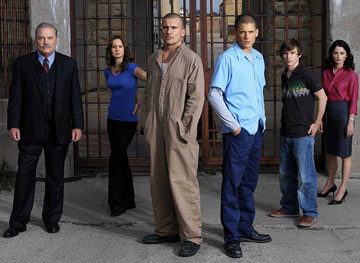 Tonight on "Prison Break", the show followed through with what the title has been promising all season long. This episode happened to be the second I have ever seen after last week's, so I'm new to the show.... What can I say? It comes on right before "24".
Tonight on "Prison Break", the show followed through with what the title has been promising all season long. This episode happened to be the second I have ever seen after last week's, so I'm new to the show.... What can I say? It comes on right before "24".
Judging from two late season episodes, the show has many diverging serial plots (brownie points) and definite forward momentum. I'm not sure of the background and setup really, but the main character (played by Wentworth Miller, last seen as a younger Anthony Hopkins in The Human Stain (2003), and who looks like he's twelve years old) wants badly to get his brother out of jail, to the point where he got into the jail in order to get the brother out. I'm guessing somewhere earlier in the season the lawyer subplot spun into something that now seems mob-related (with the lawyer played by Robin Tunney.... hey, she was in The Craft!). There's some political intrigue too that appears not to have any correlation to the prison story; the vice president (Patricia Wettig.... hey, she was in "thirtysomething"!) is apparently being forced out of office, and some inside operative (Michelle Forbes.... hey, she was Ensign Ro!) is trying to make sure she does so without causing a fuss. Not sure where they're going with that story.... it's interesting, but gets maybe four or five minutes of total screentime.
Of course the story is action-packed; at least now it is, because they're actually breaking out of prison. I'm not so sure how my attention would have been kept earlier on.... the acting is particularly wooden and unconvincing from some of the principal characters, which makes the show more laughable than provoking. Certain storytelling techniques also seem to creak and sag with contrivance, for instance the unfortunate trashy multiple flashback sequence at the end of last week's episode, and the even trashier zoom smash cuts when going to commerical. The inevitable nail in the coffin: apparently Brett Ratner, self-annointed auteur, is a producer.
Television shows (mostly serial, but not limited to) are resolutely designed around a single event; the story develops from this event, the characters change and evolve based on this event, and the show is allowed to take off in different tangents and become something else entirely as it moves forward. A show like "Prison Break", though, works in the opposite direction.... the event this show is planned around is to come in the future, not an inciting incident from the past. The point of the show is to break out of the prison, so what happens once that mission is accomplished? Can a show still continue forward when the original conceit (and the title, after all) no longer applies?
Now the gripe: Isn't there something inherently wrong about planning an entire series around one future event? The idea being, once that event happens, the show is finished.... ah, but we know this is usually never the case, as networks sometimes continue shows past their expiration date ("NYPD Blue", anyone?). If a show like "Prison Break" is a wild success, then what to make of it once they actually break out of prison? This is a question the writers and producers are trying to answer for themselves right now, as the second season dawns in the visible distance.
Now the question: Why are networks greenlighting shows like this in the first place? Also this TV season came "Reunion", which I have not seen, which had a similar one-season-only conceit but got unmercifully axed before it could tie up its loose threads. Isn't it reckless to go ahead with a show that can't be seen as carrying forward a couple seasons down the road? Don't networks want to invest in their programming? Imagine the handful of other really good serial shows that were turned down for one-season experiments like this. People could make an argument that "24" follows in this pattern, although I disagree. I do admit that "24" has branched into a strange and somewhat disappointing form of season-long episodic-ness, but it doesn't promise to end it's conceit just because twenty-four hours have run out.... there are always twenty-four hours in future days, but not unlimited prison breaks.
One more episode of "Prison Break" left, and then next season...?
pondered by
is that so wrong?
at
10:04 PM
0
comments
![]()
Wednesday, May 03, 2006
Lost: television bloodbath 2006
I don’t even know where to begin with this one. I don’t watch as much television as it seems I may, but the TV I do watch seems to get a rise out of me.... as all great storytelling should, right?
So, if I don’t gripe enough about “24” blowing away their entire cast one-by-one, tonight’s “Lost” decided to go two at a time. This is another visible example of how
trigger-happy television shows have been this season, a weird trend if you ask me. Because all five of you that read this are likely not dedicated to “Lost”, I’ll put a humble SPOILER WARNING here, with the caveat that reading on will reveal why I must gripe about the unfortunate circumstances around the two characters that happened to bite the dust. Oh, and I’ll complain about how this flirts with sloppy writing and evidences further that the writers of “Lost” just might be flying by the seat of their pants.
Now don’t get me wrong: I’m all for the death of a main character in a serial television show as long as it is 1) surprising, and 2) challenging to the story. I’ve already vented steam about how “24” religiously does not do this as of late, and thereby is not as well-written as it could be. “Lost” is a different beast though, and the finale of tonight’s episode was gutsy and disturbing. Usually the more random and unsettling deaths of main characters hit home the hardest (everyone, look to the paragon of television serial drama that is “Twin Peaks” to back this up).... Tonight, Ana-Lucia (Michelle Rodriguez) and Libby (Cynthia Watros, who is still on my dream TV cast list) both got shot in the gut, and yup, we watched their last breaths (which was terrifying, I’ll admit) and watched them die before our eyes. Always important to have the pan-shot over the dead body for the viewer to be assured that the character is dead (Ana-Lucia, check; Libby, check)*.
Okay, so why kill these two characters? We were just starting to get to know them. Looks like real life might have played a role in this one: Both Rodriguez and Watros were arrested last December for drunk driving, and this snafu probably spelled u-n-p-r-o-f-e-s-s-i-o-n-a-l to the producers, and they set their crosshairs on the characters. Fans were already turned against Ana-Lucia when she shot and killed Shannon (an underused and thereby useless character, à la Edgar in “24”), so her departure is probably a godsend to many fans. But Libby? Oh writer/producers, what have you done?
Well, about a month ago (only two episodes ago) they decided to pull a wicked reveal that connected Libby in flashback to other characters in a challenging and satisfying way. We know little of her except she’s a clinical psychologist.... and the reveal showed us (from an omniscient POV, rare for “Lost”’s flashback-heavy character-centric episodes) that she spent some time in the loony bin too. But now Libby, who was just getting interesting, is dead.... meaning that loony bin reveal has been wasted! Bad writers, bad! You completely tarnished that plot twist, the most satisfying this season until.... well, tonight’s. But, my point being: perhaps the writers had this cool Libby-backstory idea before they decided to kill her off, thus wasting an opportunity to complicate the story through her character. With her dead, how will that awesome reveal from two episodes ago ever pay off? It won’t. The same can be said of interconnections set up in the backstories of other axed characters (Shannon, for instance), which all lead to nowhere when we don’t have the character there to make the connection for us. Dear Writers of Lost: do you have an exit strategy planned for this show? Because at times it seems like the emperor doesn’t have any clothes.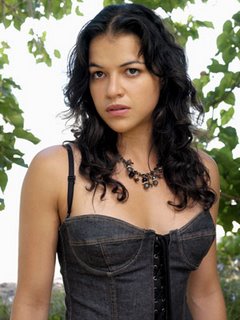 Okay, about Ana-Lucia. Was I the only one who actually liked her? They gave us an unlikable character who had a mountain to cross with the other characters, and they seemed to be doing a good job of integrating her tough-girl exterior into the fold. But, instead of taking the challenging route with her character and exploring further tensions with her, she gets popped. This was an out for the writers, an easy way to dispense with a character that the fans apparently didn’t like and an actress who was rumored to be causing problems on-set. Regardless of whatever on-set chemistry was going on, her character had more depth than quite a few of the gaggle of other whiny characters who are still sticking around. Now she’s done with, and the viewer gets no more.
Okay, about Ana-Lucia. Was I the only one who actually liked her? They gave us an unlikable character who had a mountain to cross with the other characters, and they seemed to be doing a good job of integrating her tough-girl exterior into the fold. But, instead of taking the challenging route with her character and exploring further tensions with her, she gets popped. This was an out for the writers, an easy way to dispense with a character that the fans apparently didn’t like and an actress who was rumored to be causing problems on-set. Regardless of whatever on-set chemistry was going on, her character had more depth than quite a few of the gaggle of other whiny characters who are still sticking around. Now she’s done with, and the viewer gets no more.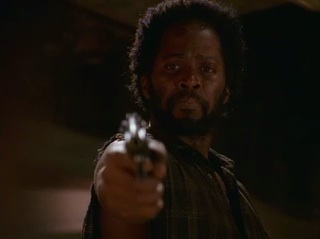 I’m not so sure my mind can be changed regarding killing off Libby, but the writers did ultimately succeed in fulfilling the two requirements above about killing main characters. I was absolutely floored, so the surprise was there. How does this challenge the story? Michael, fresh from a many-episode hiatus at the Others’ Club Med off-screen somewhere on the island, takes a sinister turn as our bad guy murderer. He betrays Ana-Lucia outright, and finishes Libby off because she was in the wrong place at the wrong time. By framing the captured Other the good guys have for these murders, it seems like Michael’s turned to be a bad guy now. Of course, this now limits his tenure on the island. BUT: This is a great reveal and justifies at least one of the deaths (sorry, Libby's death is a waste and thereby not justifiable.... so, why not take out that whiny hobbit Charlie?). The viewer knows Michael’s turned, but none of the characters do.... and thus the story is forced to change and evolve based on this reveal. This is challenging writing and presents a new course of obstacles for the characters ahead, and raises the bar for the writers. Let's hope they can make the grade.
I’m not so sure my mind can be changed regarding killing off Libby, but the writers did ultimately succeed in fulfilling the two requirements above about killing main characters. I was absolutely floored, so the surprise was there. How does this challenge the story? Michael, fresh from a many-episode hiatus at the Others’ Club Med off-screen somewhere on the island, takes a sinister turn as our bad guy murderer. He betrays Ana-Lucia outright, and finishes Libby off because she was in the wrong place at the wrong time. By framing the captured Other the good guys have for these murders, it seems like Michael’s turned to be a bad guy now. Of course, this now limits his tenure on the island. BUT: This is a great reveal and justifies at least one of the deaths (sorry, Libby's death is a waste and thereby not justifiable.... so, why not take out that whiny hobbit Charlie?). The viewer knows Michael’s turned, but none of the characters do.... and thus the story is forced to change and evolve based on this reveal. This is challenging writing and presents a new course of obstacles for the characters ahead, and raises the bar for the writers. Let's hope they can make the grade.
But, why kill off two characters played by actresses that were just hired at the beginning of the year? Obviously some kind of shake-up was in order. Unfortunately, it kind of cheapens the whole tail-section-meets-the-rest-of-the-survivors arc. I was hoping that those rumors that Cynthia Watros has landed a role in a pilot picked up for this fall were just bunk. Apparently not. And what will become of Michelle Rodriguez? At least her character got to have some steamy sex on the island before her time was up. I for one will miss her. In the end though, this episode packed a powerhouse wallop that completely blindsided me, and made for some great television. I’m just not sure how I feel about the results quite yet.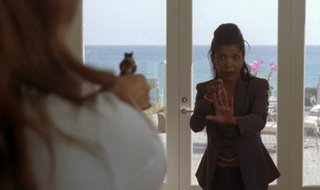 *yes, a footnote: when “24” decided in their third season to kill off the two greatest villains they’ve ever had and probably ever will have, they didn’t abide by the pan-over-the-dead-body shot when Sherry Palmer got two bullets in the gut (interesting parallel to the recent “Lost” axe-ings here). It doesn’t matter if she wouldn’t be able to survive the shooting in real life, but by television rules the viewer has to have visual evidence that the character is dead, and all we got with Sherry was to watch her get blown backward onto the floor. The camera conspicuously panned away quickly, and that was it. So, writers of “24”, do yourself a big favor and bring back Sherry to knock our socks off. You left that window open….
*yes, a footnote: when “24” decided in their third season to kill off the two greatest villains they’ve ever had and probably ever will have, they didn’t abide by the pan-over-the-dead-body shot when Sherry Palmer got two bullets in the gut (interesting parallel to the recent “Lost” axe-ings here). It doesn’t matter if she wouldn’t be able to survive the shooting in real life, but by television rules the viewer has to have visual evidence that the character is dead, and all we got with Sherry was to watch her get blown backward onto the floor. The camera conspicuously panned away quickly, and that was it. So, writers of “24”, do yourself a big favor and bring back Sherry to knock our socks off. You left that window open….
pondered by
is that so wrong?
at
11:45 PM
4
comments
![]()


